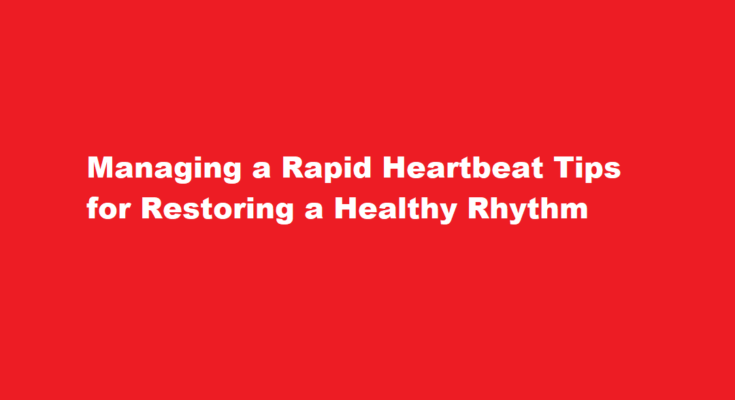A fast heartbeat, medically known as tachycardia, can be a cause for concern and discomfort. It’s important to note that while some instances of increased heart rate are normal, persistent or excessively rapid heartbeats might require attention and management. This article provides unique and informative insights into how to normalize a fast heartbeat and restore a healthy heart rhythm.
Understanding Tachycardia
Tachycardia is defined as a heart rate that exceeds the normal resting rate, typically over 100 beats per minute. There are different types of tachycardia, including atrial, ventricular, and supraventricular, each originating from different areas of the heart’s electrical system. Some tachycardias are harmless and transient, while others can indicate an underlying health condition. Always consult a healthcare professional for accurate diagnosis and guidance.
Lifestyle Adjustments
1. Stay Hydrated – Dehydration can contribute to an increased heart rate. Drink plenty of water throughout the day to maintain proper hydration levels.
2. Balanced Diet – Consume a diet rich in fruits, vegetables, whole grains, lean proteins, and healthy fats. Avoid excessive caffeine and sugary foods, as they can trigger heart palpitations.
3. Manage Stress – Chronic stress can elevate heart rate. Practice relaxation techniques such as deep breathing, meditation, yoga, or spending time in nature.
4. Regular Exercise – Engage in moderate and consistent exercise, as it improves cardiovascular health and helps regulate heart rate. Consult a healthcare professional before starting any exercise regimen.
Breathing Techniques
1. Deep Breathing – Slow, deep breaths can help calm the nervous system and regulate heart rate. Inhale for a count of 4, hold for 4, and exhale for 4.
2. Valsalva Maneuver – This technique involves holding your breath and bearing down as if you’re having a bowel movement. It can help stimulate the vagus nerve, which influences heart rate.
Hygiene for Heart Health
1. Adequate Sleep – Ensure you’re getting 7-9 hours of quality sleep per night. Poor sleep can disrupt heart rhythm.
2. Limit Alcohol and Tobacco – Excessive alcohol and tobacco use can contribute to irregular heartbeats. Moderation is key.
Herbal and Dietary Supplements
1. Magnesium -This mineral plays a crucial role in heart function. Consult your doctor about magnesium supplements to ensure you’re taking the appropriate dosage.
2. Hawthorn – Some studies suggest that hawthorn supplements may help regulate heart rate. Consult a healthcare professional before starting any new supplement.
Seeking Medical Attention
If your fast heartbeat is persistent, accompanied by dizziness, shortness of breath, chest pain, or fainting, it’s essential to seek medical attention. A healthcare provider can perform tests to diagnose the underlying cause and recommend appropriate treatment. Possible interventions include medication, medical procedures, or lifestyle adjustments.
Medications and Medical Procedures
1. Beta-Blockers – These medications can slow down the heart rate by blocking certain hormones that stimulate the heart.
2. Cardioversion –In cases of severe tachycardia, cardioversion might be necessary. It involves delivering an electrical shock to the heart to restore a normal rhythm.
3. Ablation -This procedure targets the abnormal heart tissue responsible for irregular heartbeats, often restoring a healthy rhythm.
Maintaining Heart Health
1. Regular Check-ups – Schedule routine visits to a healthcare professional to monitor your heart health and address any concerns.
2. Know Your Triggers – Pay attention to factors that seem to trigger your fast heartbeat. This awareness can help you make informed decisions about your lifestyle and habits.
3. Stay Informed – Continuously educate yourself about heart health through reliable sources, as understanding your heart empowers you to make informed choices.
Frequently Asked Questions
What causes frequent fast heartbeat?
Heart palpitations can feel like pounding, flip-flopping or the wrong amount of heartbeats. Most people get them because of anxiety. Other causes include: pregnancy, caffeine, alcohol or spicy food. Heart palpitations are common and usually aren’t dangerous.
What is a dangerously high heart rate?
If unnoticed and untreated, this can sometimes be fatal. Conditions when the heartbeat goes beyond 120-140 beats per minute or falls below 60 beats per minute, can be considered dangerous, and immediate doctor’s intervention is a must.
Conclusion
While occasional increases in heart rate are normal, persistent tachycardia requires attention. By making lifestyle adjustments, practicing breathing techniques, maintaining good hygiene for heart health, considering herbal supplements under medical guidance, and seeking appropriate medical help, you can work towards normalizing your heartbeat and promoting a healthier heart rhythm. Always consult a healthcare professional before making significant changes to your routine or starting any new treatments.
Read Also : Crafting The Perfect Song A Harmonious Journey of Musical Creation



